At FIRST Lego Championship, Illinois Youngsters Have a Blast Doing Robotics, Encountering Deep Space
Feburary 12, 2019
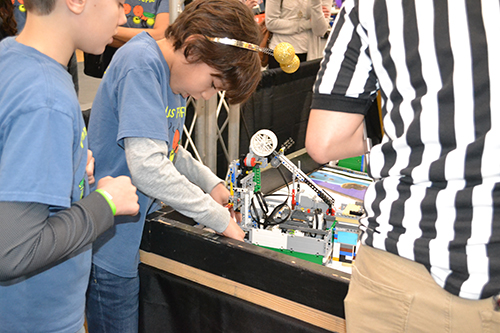
The Curious Fireflies team competes their lLego robot at the FIRST Lego Championship.
After working for months to build then program their Lego Mindstorm robots to do space-related activities, 48 teams of 4th–8th graders (9–14-year-olds), including four local teams, showed up at the ARC on Saturday, January 26th, to compete in the FIRST Lego Championship for central and southern Illinois. The competition is sponsored by FIRST (For Inspiration and Recognition of Science and Technology) Robotics, and its partner Lego, (a foundation supporter), with support from its local partner, Engineering at Illinois. Along with robotics, the youth learned a bit about space; gained leadership, team-building, and communication skills; plus gained some core, life-long values.
"They're learning how to be leaders and how to talk to members of the community about what they have done," explains Sarah Lubic, the FIRST Lego League program director for state of Illinois, regarding some of the skills besides robotics that the young participants were gaining through the experience.
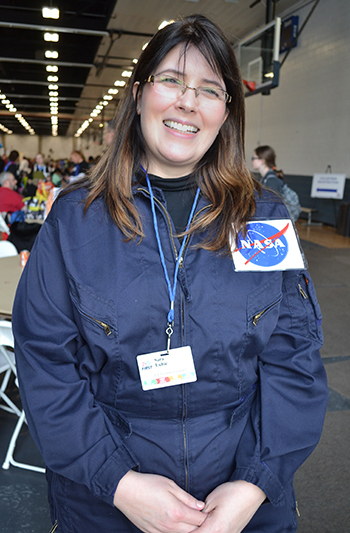
FIRST Lego League program director for state of Illinois, Sarah Lubic.
For Lubic, the January 26th event was her third and final state championship for the year, part of a year-long process that began last summer. For example, as part of the statewide competition, each of the 600 FIRST teams registered in the state, which can be started by organizations, schools, and individuals, and can be corporate funded, had built a robot using Lego pieces from kits then programmed them to drive autonomously and interact with a table filled with various challenges related to this year’s theme: Destination: Deep Space, which addressed the challenges having to do with living or working in space for a long period of time.
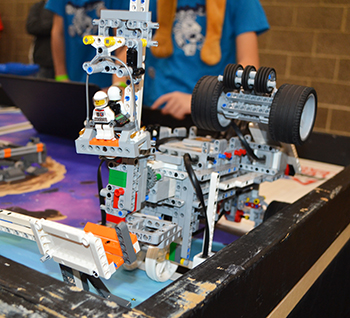
The Robo-Lions test out their robot prior to competing.
Teams also had to build, entirely of Legos, the set of challenges that filled their table. The various missions and field elements on the table were designed by a Lego educator, along with someone at FIRST headquarters. Teams registered over the summer then received their kit and built their own set and table.
One of the key technological challenges, of course, was programming the robot to do the various tasks. Most teams used the software that came with the kit. However, for the first time, teams were allowed to use other software coding programs, such as Microsoft’s version.
During the contest, each team’s robot had to do various missions on the table worth a certain number of points, following the process they had developed over the year designed to give them the most points off the table. Scoring was done by referees.
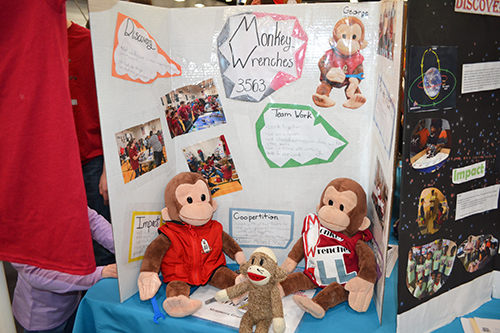
The Monkey Wrenches' team display board with their core values.
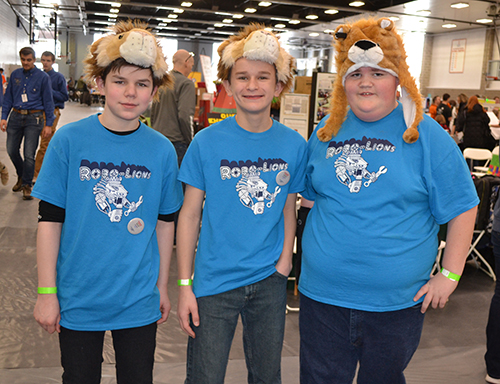
The Robo-Lions team with their lion hats.
In addition to the kids learning robotics, another of FIRST’s goals is to teach the kids some of its core values: discovery (exploring new skills and ideas); innovation (using creativity and persistence to solve problems); impact (improving our world); inclusion (respecting each other and embracing differences); teamwork; and fun. To emphasize these values, teams were to create display boards demonstrating how they had implemented these values during the process. In addition to competing their robot, teams also had to give five-minute presentations to a panel of judges, which included some engineering students, during which they explained what their team had done in support of the program, how they’d grown, and what they’d learned as a team over the season. Plus, teams were evaluated on how their teamwork skills were being demonstrated during competition.
While the competition was obviously about competing, along with gaining skills and emphasizing character, it also emphasized fun. For instance, each team wore matching costumes related to the theme, or their team’s name. Plus, the referees and judges added some fun to the event via their outlandish hats.
In addition to practicing their presentation and communication skills with the judges, during the season, many kids had opportunities to communicate with experts in the field of space exploration. Many worked directly with people at NASA and SpaceX, asking the experts questions then getting feedback on their project. So in addition to the many other things participants learned, they also some things about deep space.
With its carnival-like atmosphere, the competition also provided additional learning experiences. For instance, representing Illinois Engineering were groups from several of its student organizations, ISS (Illinois Space Society), as well as Illini Motorsports, who set up exhibits featuring rockets and motors to expose the young participants to engineering.
Plus, for some teams, the fun and exposure to new things won’t stop. The top team from this event can go to Detroit in April, plus FIRST brings teams together from around the world into world festivals, such as Houston in April 2019. Plus teams can go to Turkey or Australia to compete.
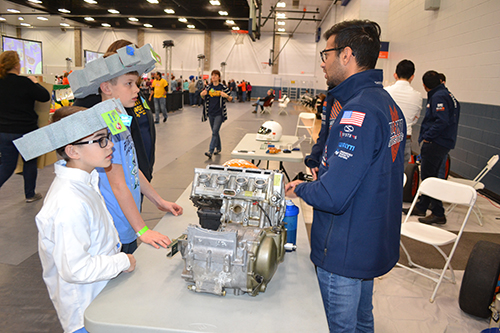
A couple of gear heads speak with Illinois students about engines at the Illini Motorsports table.
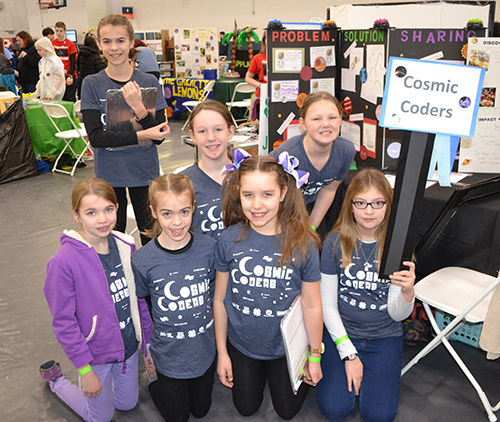
Local team from Champaign-Urbana, the Cosmic Coders at the FIRST Lego Championship.
In addition to the program’s many short-term goals, one of its long-term goals is to get kids into the STEM pipeline: According to Lubic: “The idea behind FIRST is that if we do not start younger with getting kids interested in STEM, they are not going to end up in the field, and we don't have enough kids going into these fields.”
In addition, another goal of FIRST, as well as many of the folks involved with the program, is to increase the diversity in STEM fields.
“There's a huge focus on women and minority students,” adds Lubic. “They want to bring in and change the culture of what is the face of STEM. There's a huge push to really include and expand the horizon of what does STEM look like. There's a huge push for equity and inclusion from the organization as a whole.”
She goes on to explain why diversity in STEM fields is important: it produces diversity of thought.
“The idea within the program is that the more diversity that you have on a team, the stronger the team becomes because you have these divergent perspectives that then get brought together, and then they culminate into this more cohesive, more full team. Because everyone brings a different viewpoint.”
One woman in STEM who can attest to the benefit of participating in the program is Illinois Aerospace junior, Katie Carroll, who served as a judge at the competition. Carroll has participated in FIRST since she was in 5th grade. When she hit 18, she began volunteering to help out with the events, starting as a referee, and now as a projects judge. She shares the significant impact the program can have on kids, based on its role in her life in regards to her STEM career aspirations.
“FIRST Lego League is one of the most influential things, I think, that can really get students in elementary and middle school engaged in engineering challenges early on. It was super influential in getting me into STEM. I love it because they actually get to build the robot with their hands.” She claims the robots they build are “super versatile, and you can build whatever you want,” then adds that participating in FIRST gives kids more than just robotics. “They encourage not just building the robot,” she continues, “but it's part of being a team, and it's about developing a project too.”
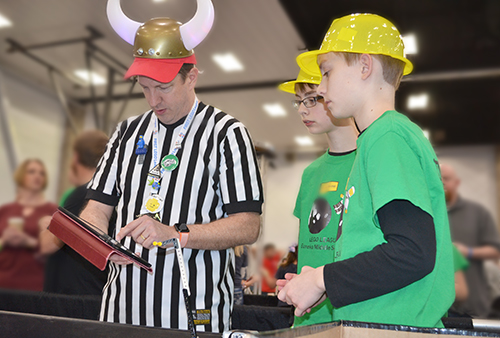
Members from the Eureka Middle School team interact with the referee while competing.
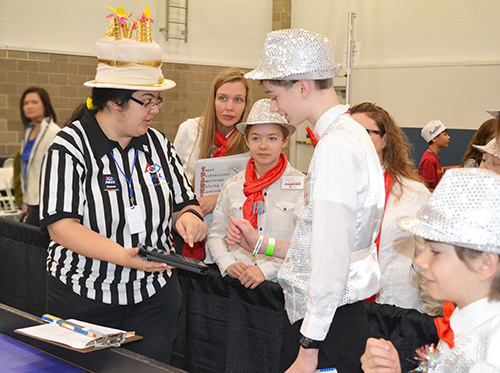
The Sparklers team listens as the referee explains about ratings she's given them.
What does Carroll find so rewarding about FIRST that has kept her involved with the program so long as an adult? “I love seeing the kids come up with inventive solutions to really unique problems.”
Regarding FIRST’s ability to pique kids’ interest in STEM, Lubic’s own children, have now moved on from this age bracket and are in their second year in the FIRST Tech Challenge’s 3rd level. A sophomore and junior in high school, both are planning on pursuing careers in STEM or maybe business. Regarding the benefits of FIRST’s multi-level program, she explains, “You want them to finish this level wanting more, because then when they participate in high school, in robotics, they now are in a group of individuals who are a smaller pool and have a huge body of experience to talk about.”
One of the benefits of FIRST is that there's a community of individuals who are on the kids’ side: “These are kids, adults, and families that recognize the need to inspire kids, to give them an open-ended, no holding back experience.”
She explains the impact interacting with adults in this supportive community can have on a kid. “It opens your eyes when you're told that you need to consult with people who work in the industry as a part of your game. It changes the mindset. ‘Can I call this company up? I'm just a sixth grader!’ Yeah, you can. When they get a response, their whole world shifts because this is such an amazing experience.”
She goes on to share what she personally finds rewarding about the competition.
“You'll see a team struggle, struggle, struggle to do just one small movement all day long, and the last round it comes together and they're all losing their minds because it finally working and they figured it out. It's that perseverance and spirit of not giving up that—it's like that Explorer Gene they call it sometimes—you just want to know how.”
“It's such an amazing environment to get your kids into," she adds, summing up the FIRST experience.
Author/Photographer: Elizabeth Innes, Communications Specialist, I-STEM Education Initiative
More: FIRST, K-12 Outreach, STEM Pipeline, 2019

A couple of members of the These Are the Droids You Are Looking For team speak to the referee during judging.
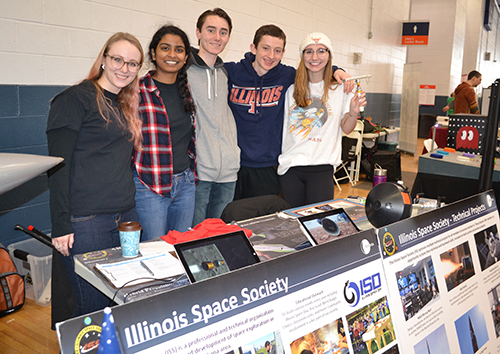
Illinois Space Society's exhibit to introduce the FIRST competitors to opportunities in aerospace at Illinois.
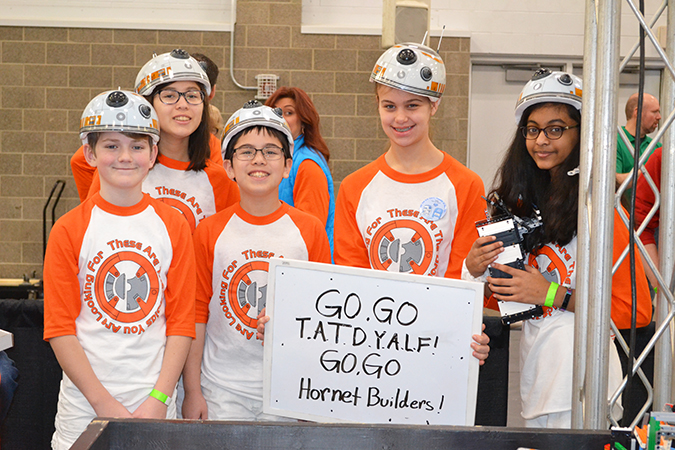
Members of the These Are the Driods You Are Looking For (T.A.T.D.Y.A.L.F) team at the FIRST Lego Champtionship.













.jpg)
















